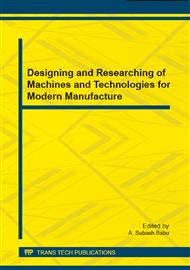p.117
p.121
p.125
p.130
p.135
p.139
p.144
p.148
p.153
Fiber Orientation Angle Optimization for Minimum Stress of Laminated Composite Plates
Abstract:
The genetic algorithm is used to minimize the stress of the laminated composite plates by optimizing the fiber orientation angle. The objective function of optimization problem is the minimum stress in center of laminated composite plates under the external load; optimization variables are fiber orientation angle. The results for the optimal fiber orientation angle and the minimum stress of the 2-layer plates and 3-layer plates are presented.
Info:
Periodical:
Pages:
135-138
DOI:
Citation:
Online since:
December 2014
Authors:
Price:
Сopyright:
© 2015 Trans Tech Publications Ltd. All Rights Reserved
Share:
Citation:


